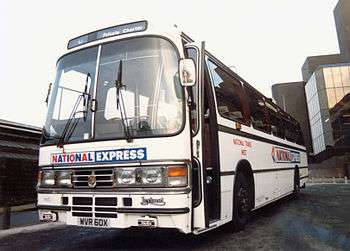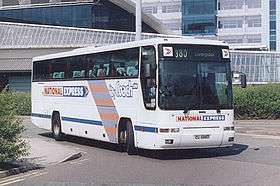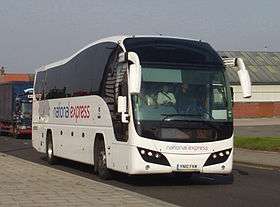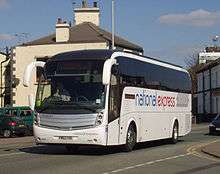National Express Coaches
National Express[1] is an intercity and Inter-regional coach operator providing services throughout Great Britain. It is a subsidiary of National Express. Most services are subcontracted to local coach companies. The company's head office is in offices above Birmingham Coach Station.[2]
| Parent | National Express |
|---|---|
| Founded | 1972 |
| Headquarters | Birmingham Coach Station |
| Service area | Great Britain |
| Service type | Intercity and InterRegional coach services |
| Hubs | Birmingham London Manchester Gatwick Airport Heathrow Airport Southampton Leeds |
| Website | www |
History

Pursuant to the Transport Act 1968, the National Bus Company was formed as a holding company for the many state-owned local bus companies. Many of these bus companies also operated coach services and these were initially branded as National. The National Express brand was first used in 1974 although the coach services continued to be operated by the individual companies.[3][4]
Coach services were deregulated under the Transport Act 1980, and buses by the Transport Act 1985. In March 1988 National Express was privatised in a management buyout.[5] In July 1989 the company bought ATL Holdings[6] (with operations in Sheffield) and a 50% share in Yelloway Trathen, which was renamed Trathens Travel Services.[7][8]
In August 1989 the Eurolines services from London to Alicante, Barcelona and Paris were purchased from Wallace Arnold, and the express services (with 29 coaches) in Scotland and to London from Stagecoach. These were operated under the Caledonian Express brand.[9]
In June 1991 National Express was sold to the Drawlane Group.[10][11] In December 1992 National Express Group plc was floated on the London Stock Exchange.[3]
In its early years National Express had little competition in the long-distance coach market. A number of operators attempted to compete with the company after deregulation in 1980, the largest being the British Coachways consortium, but most had ceased to compete by the end of the decade.[12] However, in 2003, Stagecoach introduced Megabus, a no-frills service whose £1 fares sparked a price war with National Express in autumn 2004. The competition intensified in 2007 when Megabus transferred its London terminus from the Green Line Coach Station into the main Victoria Coach Station.
In November 2007 National Express announced plans to re-brand all its operations under a new unified National Express identity.[13] As part of this the coach operation received a slightly different livery, retaining the red, white and blue theme, but with a new lower-case logo. Coaches started appearing in the new livery from December 2007.
National network
A national network links more than 540 locations, including 59 of the UK mainland's 64 cities, with 1,800 plus services operating every day, increasing to over 1,900 on Fridays. Over 1,000 airport services a day run direct to the terminal for all major UK airports.
Operations


National Express offers many routes to destinations across the country. In addition, shuttle and airport services are also operated, although there is no obvious difference to the passenger between a standard, shuttle or airport service with regard to branding.
Many National Express coach routes pass through several town centres, which increases journey times for longer journeys considerably. A smaller number of shuttle services operate at least once an hour over faster direct routes.
National Express operates coach services direct to the terminal for all major UK airports, 24 hours a day, with 1,100 airport services every day, including East Midlands, Gatwick, Heathrow, Luton and Stansted. The Airport brand was created in 2003 when the National Express image brand was updated, merging the former Airlink, Flightlink, Jetlink and Speedlink brands. In the 2007 re-brand, the Airport branding was dropped, although the 'Airport' coding is still used on tickets.
2020 suspension
All services were suspended from 6 April 2020, after passenger numbers were greatly reduced by travel restrictions imposed during the coronavirus pandemic.[14] Services restarted nearly three months later on 1 July, on about a quarter of route mileage and with reduced frequencies.[15]
Accessible travel
99% of the National Express fleet are fitted with wheelchair lifts. Wheelchair users are not required to book in advance but a dedicated Assisted Travel Team are available to help with booking and can advise on wheelchair compatibility and accessible stops.
National Express coaches are modern and comfortable with reclining leather seats, air conditioning, free entertainment via VUER (a complimentary onboard entertainment app offering films, TV and magazines), free wifi, power sockets and toilets.
Franchised operators
The majority of National Express services are contracted on long-term agreements to local coach companies, known as partner operators. As part of the contract, operators are required to use coaches in full National Express livery. On occasion, an operator will use its own branded vehicle due to lack of availability, but will be penalised financially for doing so. A wider list of additional operators are also available to bid for occasional work on the network – usually providing a one-off duplicate service to meet demand. Whilst still having to meet strict criteria, these coaches are usually not in National Express livery.
National Express operates some services itself, primarily those between Gatwick, Heathrow and Luton airports, and Victoria Coach Station, London Liverpool Street and Woking.
Below is a list of partner operators:
- Ambassador Travel, Great Yarmouth
- Bennetts Coaches, Gloucester
- Bruce's Coaches, Salsburgh, North Lanarkshire
- Chalfont Coaches, Southall
- Edwards Coaches, Llantwit Fardre and Avonmouth
- East Yorkshire, Kingston upon Hull
- Galloway European, Mendlesham
- Go North East, Chester-Le-Street
- Go South Coast, Poole
- Go Whippet, Swavesey
- Lucketts Travel, Fareham
- Llew Jones International, Llanrwst
- National Express West Midlands (Walsall Garage)
- Park's Motor Group, Hamilton
- Reading Buses, Reading
- Selwyns Travel, Runcorn
- Skills Coaches, Nottingham
- Stotts Coaches, Huddersfield
- Stagecoach Yorkshire, Barnsley
- The Kings Ferry, Deal
- Travelstar European, Walsall
- Travel de Courcey, Coventry
- Wilts & Dorset, Salisbury
- Yellow Buses, Bournemouth
- Yeomans Canyon Travel, Hereford
Fares
National Express tickets are available through a variety of methods, including on-line and telephone booking, and varied pricing structures. Traditionally, tickets are sold through National Express ticket offices at coach stations, or by third-party agents at bus stations and travel agents. These sell tickets generally at the 'Standard Fare' or the 'Advance Fare' when booking in advance. A similar ticketing structure applies with the telephone booking service. Since 2013, tickets have also been available for purchase from the Post Office.[16]
With the introduction of competition from Megabus, more competitive internet-only Funfares were introduced. These often have stricter conditions imposed, such as being non-refundable, and are restricted to certain corridors.
Other ticket types include 'Season Tickets' and 'Multi-rides', aimed at frequent travellers, although in many cases FunFares are cheaper; and BritXplorer, which allows foreign tourists unlimited travel for a specified period.
Coachcards
National Express offers several discounts to customers.
- Young Persons Coachcard – Available to people aged 16–26. This card gives a third off standard and fully flexible fares, plus 15% off events services.
- Senior Coachcard – Following the Government's scrapping of the concessionary half-price fares for the over-60s in October 2011, National Express introduced a Senior Coachcard. Available to over-60s, this gives a third off standard and fully flexible fares.
- Disabled Coachcard – Following the government's scrapping of the concessionary half-price fares for disabled people in October 2011, National Express introduced a Disabled Coachcard. Available to adults registered as disabled, this gives a third off standard and fully flexible fares.
Fleet

National Express and its franchisees operate a number of vehicle types.
The primary coach type on the network is the Caetano Levante, which may have 2 or 3 axles. This has been the main vehicle of choice since 2006. The most recent Levante III was introduced onto the network in July 2018.
Other branded vehicles used on the network include (in order of quantity):
- Plaxton Elite (2 and 3 axle versions)
- Caetano Boa Vista (double decker)
Having withdrawn all its double deck coaches after an accident in January 2007, in October 2016 National Express placed six Caetano bodied Scania K410s into service.[17]
On-board services
In the mid-1980s during the Rapide era, an on-board tea service and on-board televisions were in operation. These were given extensive advertising campaigns as shown on the BBC Three documentary History of the Coach.
In April 2001 National Express phased out its on-board catering service, having already phased out its on-board television service in the 1990s. However, in late 2004 National Express launched NXTV or National Xpress Television. Rather than showing a whole film as on an aircraft, NXTV would instead show various episodes of British television series such as A Touch of Frost, My Family and Top Gear, all of which were commissioned by ITV and the BBC. The service was displayed on small monitors situated above the overhead luggage compartments, powered by a motor to move downwards and upwards while the programming would be played from a DVD drive at the driver's dashboard.
The service was phased out in the summer of 2006, due to a lack of interest in purchasing headphones, available at vending machines in the major stations and also via on-board vendors before a journey. The reason for the service's failure was that the headphone jack was compatible with any headphone, removing any reason to buy those offered. Also, by the time NXTV was launched, the Apple iPod was already at its height of popularity, diverting interest away from it. Programming was also very limited, with many of the episodes being frequent repeats from terrestrial television. The headphones were later given away free when the service was about to be ceased. The advertising slogan was "Television shows as you board the coach".
National Express Coaches now offers free WiFi on most coaches. Passengers can connect to a digital entertainment service, VUER, and watch hours of films and TV for free.
Accidents
Since National Express started operating, incidents include:
- 26 July 1974: Three killed and over 30 injured when a double-decker overturned on the M1 near Luton after swerving to avoid an earlier collision.
- 17 August 1983: Three killed on the M4 motorway near Swindon when a lorry careered into the side of a coach.
- 3 August 1985: One killed and 40 injured when a double-decker overturned on the A1 in County Durham after swerving to avoid a sheep on the carriageway.
- In 2007, two coaches were involved in separate fatal accidents, in January and September.
- On 4 September 2009 at Gatwick Airport, a car collided with and ended up underneath a National Express coach. The single occupant of the car was killed instantly. The coach driver was taken to hospital and treated for shock. One coach passenger suffered a minor injury.[18][19][20]
- On 17 April 2018 a coach travelling from Manchester to Birmingham was involved in a crash on the M6 motorway near Crewe; two people on board were injured and taken to hospital.
See also
- List of bus operators of the United Kingdom
- Coach transport in the United Kingdom
- ALSA, another bus & coach subsidiary of National Express
References
- Companies House extract company no 232767 National Express Limited
- "LSH plays integral role in £15m redevelopment of Birmingham Coach Station". LSH. Archived from the original on 9 October 2011.
- National Express Group: Our History National Express
- National Express Group PLC and Saltire Holdings Ltd Monopolies & Mergers Commission February 1994 page 3
- Express sale set for DTp approval Commercial Motor 10 March 1988
- Companies House extract company no 2036613 Airlinks The Airport Coach Company Limited formerly Airport Express Trains Limited formerly ATL (Holdings) Limited
- Companies House extract company no 1792858 Trathern Travel Services Limited formerly Yellow-Trathern Express Limited
- National snaps up ATL Commercial Motor 27 July 1989
- National Express grows Commercial Motor 10 August 1989
- Companies House extract company no 1946383 Burroughs Hill Limited formerly Drawlane Group Transport plc
- Drawlane team snaps up NEG Commercial Motor 4 July 1991
- Townsin, Alan (1992). "Coach deregulation arrives". The British Bus Story – The Early '80s: The Die is Cast. The Transport Publishing Company. pp. 22–24. ISBN 978-0-86317-170-3.
- New Identity for National Express Group National Express 15 November 2007
- Xie, Qin (2 April 2020). "National Express to suspend all coach services". The Independent. Retrieved 3 April 2020.
- Calder, Simon (18 June 2020). "National Express will start running coach services again on 1 July". The Independent. Retrieved 4 August 2020.
- "National Express Tickets - Post Office". www.postoffice.co.uk. Retrieved 18 March 2018.
- National Express dips toe in double-deck coach market Route One 26 October 2016
- "Crash Leads to Gatwick Congestion". BBC News. 4 September 2009. Retrieved 19 May 2010.
- "Bus crash victim Melanie Wisden's family describe their heartbreak". Wales Online. 7 September 2009.
- "Gatwick crash woman's lift favour". BBC News. 6 September 2009. Retrieved 19 May 2010.